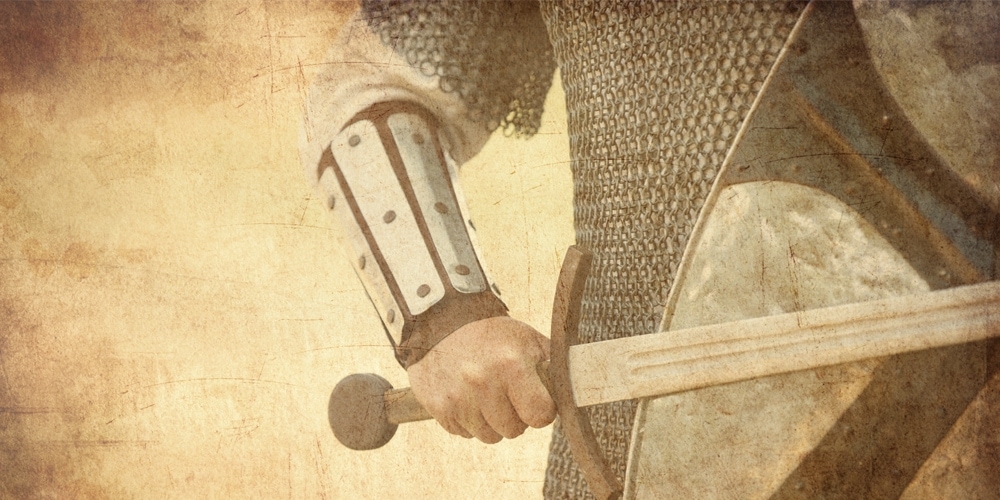
God is always here, wherever, and elsewhere. He has no physical limits, mental boundaries, or strategic perimeter. He’s in charge. As Joshua discovered outside Jericho’s walls one day. He sees an armed man standing across from him holding a drawn sword. Joshua isn’t about to be intimidated. He’d like to know where the man stands: “Are you for us or for our enemies?” (Joshua 5:13).
The weapon doesn’t make Joshua run, but the man’s answer makes him fall: “Neither,” is the man’s response, “but as commander of the army of the Lord I have now come” (verse 14). Whereupon Joshua collapses, facedown to the ground in reverence.
This is no man. This is the Man who is God, borne out by the Man’s next instruction: “Take off your sandals, for the place where you are standing is holy” (verse 15). Humbling, perhaps, but also utterly inspiring: the God who once chose Moses, the Captain of the host, Michael, who leads the charge against all devilry (Rev. 12:9), was now choosing Joshua. Michael, “one of the chief princes” (Dan. 10:13), was recruiting him.
But why should anyone speak of Michael as one of some group, even an important group like “princes”? Is Michael one of several, or is He Lord of all?
Daniel has an answer: He is the great protector Prince; the Prince who stands guard over God’s children (Dan. 12:1). He is alone in bearing this title. And the title, Protector of Right, reverses us into a past eternity in which right once needed no protection. Until flawlessness begins to be tampered with; and ugliness first rises as beautiful speculation and intriguing hypothesis; where hypothesis and speculation grow into theoretical construct, into wonder about the unprecedented, the courage of invention that might improve the status quo. Query surfaces about the appropriateness of some specific aspect of administration, about the selection of personnel; about according individuals—Michael in specific—some form of unique, distinct attention, special treatment. Where wonder gels to personal persuasion about right and wrong and righting wrong: exalting Jesus as the Father’s equal is “an act of injustice both to himself and to all the heavenly host.” “Coveting [Michael’s] glory” becomes an obsession.1
Now, Lucifer’s language notwithstanding, it is not possible to “exalt” Jesus from anywhere. The Father summons a grand assembly in one of heaven’s vast amphitheaters, where all may hear and be heard, to “set forth the true position of His Son and show the relation He sustained to all created beings.”2 He explains to heaven’s “assembled inhabitants” that “none but Christ, the Only Begotten of God, could fully enter into His purposes, and to Him it was committed to execute the mighty counsels of His will”; Jesus is worthy of their worship. They owe Him as much “homage and allegiance” as they do the Father.3
Some of the host have no idea of what the Father speaks. They wonder, How shall we respond to these notions going forward, as we all do what we’ve always done?
The answer to their torrent of queries is quite uninspiring: there’s no such thing as an “explanation” of anything related to where sin comes from. But while we do not know how to explain sin’s birth, how to relate to this challenge on Michael and exaltation, we know this truth about Michael: He is not standoffish: He didn’t become humble temporarily. No.
Michael chose humanity: He “pitched His tent by the side of the tents of men, that He might dwell among us, and make us familiar with His divine character and life.”4 Moreover, He chose to bear humanity “weakened by four thousand years of sin. . . . He came with such a heredity to share our sorrows and temptations, and to give us the example of a sinless life.”5
Make no bones about it, Michael our warrior leader leads from the front. Where He’s been we will never need to go: He went there for us, to confound, defeat, and destroy the devil, and free us forever from hell.
Michael is God for and with us; leading and accompanying, showing and assisting, at the helm and at our side, doing it all and helping us work it out. He is one of a group because He is one of us! If only we “could see and understand that in this last conflict the Captain of the Lord’s host is leading on the armies of heaven, and mingling in the ranks and fighting our battles for us.”6
Why else would they call Him Immanuel?
Lael Caesar is an associate editor of Adventist Review.
1Ellen G. White, Patriarchs and Prophets (Mountain View, Calif.: Pacific Press Pub. Assn., 1958), pp. 33-43.
2Ibid., p. 36.
3Ibid.
4Ellen G. White, The Desire of Ages (Mountain View, Calif.: Pacific Press Pub. Assn., 1898, 1940), p. 23.
5Ibid., p. 48.
6Ellen G. White, Manuscript Releases (Silver Spring, Md.: Ellen G. White Estate, 1990), vol. 14, p. 286.